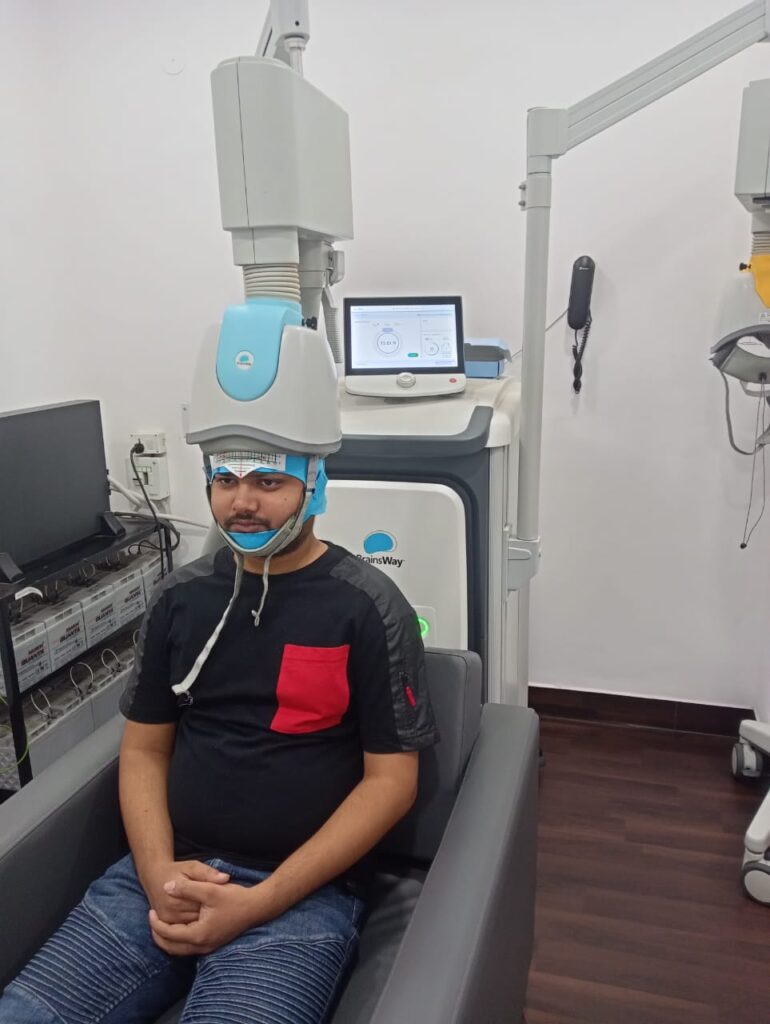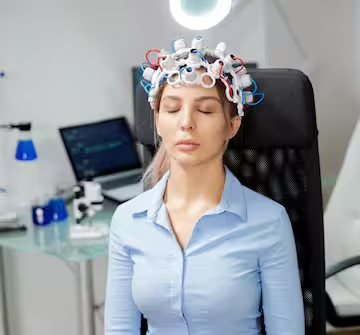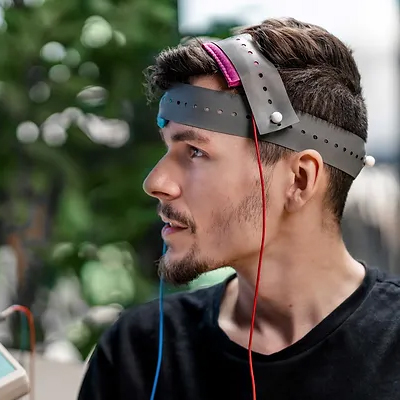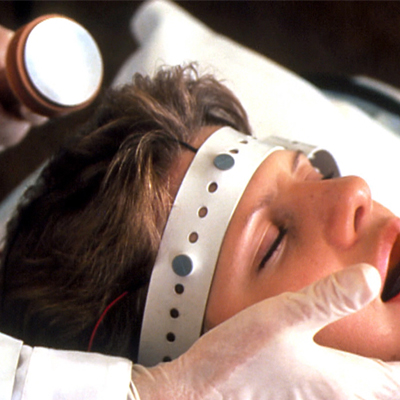DeepTMS
DeepTMS offers a non-invasive method to stimulate deeper brain structures, offering potential relief for various mental health conditions. Know more about DeepTMS
rTMS
rTMS uses magnetic pulses to stimulate specific brain areas, offering a non-invasive treatment option for conditions like depression. Know more about rTMS
tDCS
tDCS uses weak electrical currents delivered through electrodes on the scalp to modulate brain activity. Know more about tDCS
ECT
ECT involves the use of controlled electrical currents to induce brief seizures, primarily used to treat severe mental illnesses like major depressive disorder. Know more about ECT
Deep TMS Therapy: Advanced & Affordable Brain Stimulation in Varanasi
We are proud to be the first in Uttar Pradesh to offer Deep Transcranial Magnetic Stimulation (dTMS), a revolutionary, non-invasive treatment for mental health conditions. At Deva Institute, we understand that effective treatment should also be accessible. That’s why we’re committed to providing cost-effective dTMS therapy, bringing relief to patients with depression, OCD, and other conditions.

How Deep TMS Works: Targeted Relief, Deeper Impact
Unlike traditional TMS, dTMS utilizes specialized H-Coils embedded in a comfortable helmet. These coils generate magnetic pulses that penetrate deeper into the brain, stimulating targeted regions with greater precision. This deeper stimulation leads to more effective relief, especially for patients who haven’t found success with other treatments.
Specialized H-Coils for Targeted Treatment
H1 Coil (Depression):
- Effectively treats Major Depressive Disorder (MDD), anxious depression, and late-life depression.
- Stimulates the bilateral prefrontal cortex, focusing on the left dorsolateral prefrontal cortex.
- Clinical studies show significant symptom improvement.
H7 Coil (OCD & Depression):
- Targets the anterior cingulate cortex and medial prefrontal cortex.
- Provides substantial relief for Obsessive-Compulsive Disorder (OCD) and anxious depression.
- High rate of sustained response.
H4 Coil (Smoking Addiction):
- Stimulates the bilateral insula and prefrontal cortex.
- Aids in smoking cessation with prolonged abstinence.

The Advantages of Deep TMS Therapy
Non-Invasive & Comfortable: No surgery, anesthesia, or lengthy recovery periods.
Effective for Treatment-Resistant Conditions: Provides relief when medications and therapy have failed.
Minimal Side Effects: A safe alternative with fewer side effects than other treatments.
Cost-Effective Solution: We strive to make dTMS accessible and affordable, providing a valuable long-term investment in your mental health.
Short & Convenient Sessions: Each session lasts about 20 minutes, fitting easily into your daily routine.
Other Neuromodulation Services: Expanding Your Treatment Options
At Deva Institute, we offer a range of neuromodulation therapies, in addition to Deep TMS, to provide comprehensive treatment options for various mental health conditions. We understand that each individual’s needs are unique, and we’re committed to offering diverse, evidence-based treatments.

Repetitive Transcranial Magnetic Stimulation (TMS): Targeted Relief for Depression
Repetitive Transcranial Magnetic Stimulation (TMS) is a non-invasive procedure that uses magnetic pulses to stimulate nerve cells in 1 specific areas of the brain. It’s particularly effective for treating major depressive disorder, especially in cases where patients have not responded well to traditional antidepressants or psychotherapy.
How TMS Works:
- A magnetic coil is placed on the scalp near the area of the brain believed to be involved in mood regulation.
- The coil emits short magnetic pulses, which induce small electrical currents in the brain tissue.
- These currents stimulate nerve cells, leading to improved mood and reduced depressive symptoms.
Benefits of TMS:
- Non-invasive and well-tolerated.
- Minimal side effects compared to medication.
Effective for treatment-resistant depression. - Outpatient procedure with no downtime.
What to Expect:
- Sessions typically last 30-60 minutes.
- Multiple sessions are required over several weeks.
- Patients remain awake and alert during treatment.

Transcranial Direct Current Stimulation (tDCS): Gentle Brain Stimulation
Transcranial Direct Current Stimulation (tDCS) is a non-invasive neuromodulation technique that uses a low, constant electrical current to stimulate specific areas of the brain. It’s used to treat a variety of conditions, including depression, anxiety, chronic pain, and cognitive impairments.
How tDCS Works:
- Small electrodes are placed on the scalp.
- A weak electrical current is passed between the electrodes, modulating brain activity.
- The current can either increase or decrease neuronal excitability, depending on the placement of the electrodes.
Benefits of tDCS:
- Non-invasive and painless.
- Minimal side effects.
- Portable and relatively inexpensive.
- Potential for home-based treatment under medical supervision.
What to Expect:
- Sessions typically last 20-30 minutes.
- Multiple sessions are required over several weeks.
- Patients may experience mild tingling or itching at the electrode sites.

Electroconvulsive Therapy (ECT): Effective Treatment for Severe Conditions
Electroconvulsive Therapy (ECT) is a well-established and highly effective treatment for severe mental health conditions, including severe depression, bipolar disorder, and catatonia. It involves a brief electrical stimulation of the brain while the patient is under general anesthesia.
How ECT Works:
- A controlled electrical current is passed through the brain, inducing a brief seizure.
- This seizure is thought to cause changes in brain chemistry that improve symptoms.
- Patients are given anesthesia and muscle relaxants to minimize discomfort and prevent injury.
Benefits of ECT:
- Rapid and significant symptom improvement.
- Effective for treatment-resistant conditions.
- Often life-saving in severe cases.
What to Expect:
- Performed in a hospital setting.
- Multiple sessions are required over several weeks.
- Patients may experience temporary memory loss or confusion.
Choosing the Right Neuromodulation Therapy:
Our experienced psychiatrists will conduct a thorough evaluation to determine the most appropriate neuromodulation therapy for your specific needs. We’ll discuss the benefits, risks, and potential side effects of each treatment option to help you make an informed decision.
Schedule Your Deep TMS Consultation in Varanasi:0542 2313652, 2310670
Discover the benefits of affordable and advanced brain stimulation.
